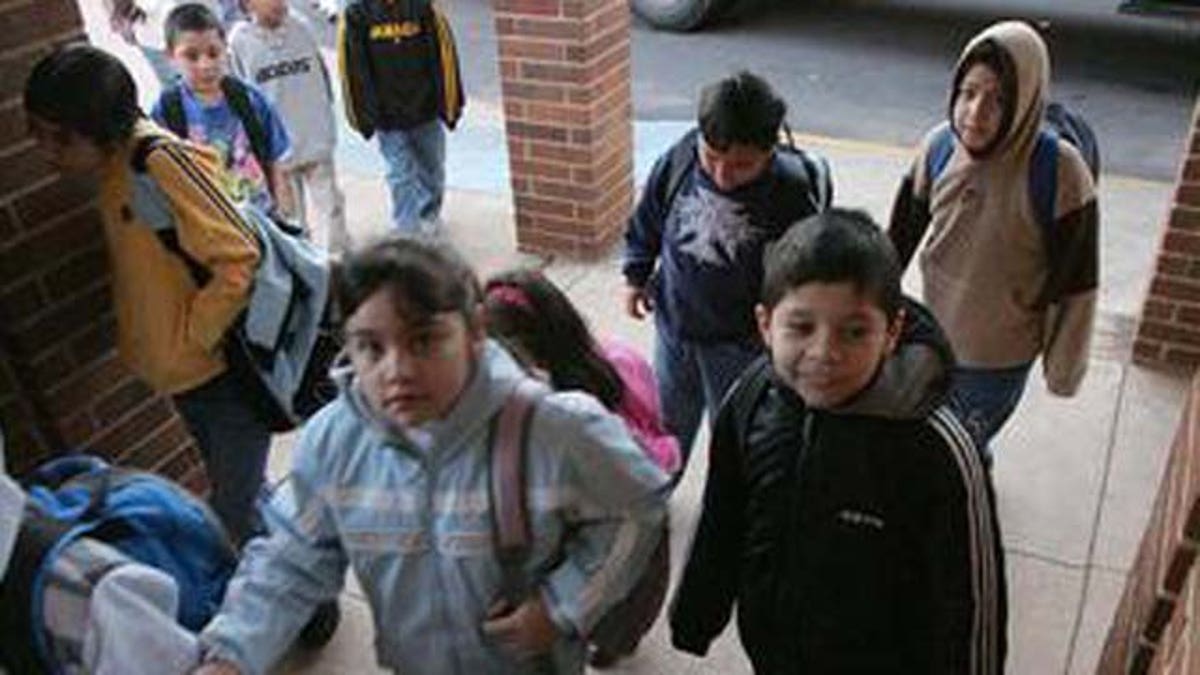
** ADVANCE FOR WEEKEND OF MARCH 19-20 **Students make their from their buses to school at the Lyman Hall Elementary school in Gainesville, Ga., Wednesday, Feb. 23, 2005. Lyman Hall Elementary is listed as 94 percent Hispanic. (AP Photo/Ric Feld)
Latinos are keeping up with their part of the social contract—but it's still hard to keep head above water, concludes a new study on the economic well-being of Hispanic kids.
In 2009, Latinos experienced the largest one-year drop into poverty of any racial or ethnic group—despite the fact that Hispanics were also most likely to be fully employed and live in two-parent households.
“The impetus for the study was the release of the Census poverty figures that came out last month,” says Melissa Boteach, one of the researchers behind the study, which was jointly published by the Center for American Progress Action Fund, the National Council of La Raza and anti-poverty program Half in Ten. “We knew it was going to be bad, because 2009 was a bad year, but how bad it really was, was startling.”
Over 33 percent of Latino kids—almost two million more than the year before—were living in poverty in 2009, the highest level for the group since 1997. This compares to about 12 percent of white children.
The immigration status is not a factor as 91 percent of Hispanic children in this country are native-born.
Poverty is lived differently by Latino families and may not respond to existing policy approaches.
“There are many thing that will lift everybody up out of poverty, such as a good economy,” says Boteach. “But we wanted to show that there are certain particular challenges that the Latino community faces, and we wanted to point those out in order to suggest legislative changes that can be responsive to this reality.”
The study points out that Temporary Assistance for Needy Families (TANF), for example, by design serves primarily female-headed households. But the majority of Hispanic families living in poverty are headed by a married couple. (This in turn, might suggest marriage is not the anti-poverty panacea that pundits across the political spectrum have suggested it might be.)
Unemployment insurance, designed to hold over the beneficiary until he or she could get a new job, is another major component of the social safety net. But traditionally, it hasn’t served low-wage workers, a segment in which Latinos are disproportionately represented. (The recent changes in the Recovery Act may be changing this.) In fact, the report shows Latinos are working—hard. Poor Latinos over 16 are more likely to work full time and year round than other groups. They simply don’t make much, and they don’t enjoy some of the benefits that can make it easier to hold on to a job.
“Over 50 percent of Latinos aren’t entitled to a single paid sick day,” says Boteach. “So you’re already in a weak position because the labor market is so weak, and then your child gets sick or you get sick, and it can be hard to recover.”
The result: Thirteen percent of us work full time, all year, yet live in poverty.
“Looking past 2010, hopefully the numbers will reverse,” says Boteach. "We need an economic recovery that includes everyone."







































